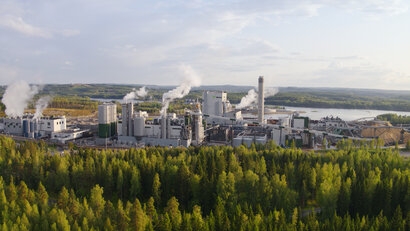
Developed in close collaboration with Metsä Fibre, the world's largest producer of market pulp and global manufacturer of sawn wood, the refinery will rely on an innovative concept from Veolia to produce on an industrial scale, commercial bio-methanol from bioproducts, by safely integrating a process for refining sulphated crude methanol into the pulp production process.
This project will contribute to Europe's energy security while supporting the European decarbonisation ambitions of the Green Deal for Transport, as CO2-neutral industrial-grade bio-methanol represents a new sustainable fuel source to replace combustibles. fossils.
The refinery, owned and operated by Veolia, will be adjacent to and partially integrated with Metsä Fibre's Äänekoski plant in Finland. With an annual production capacity of 12,000 tonnes and commissioning scheduled for 2024, the plant will reduce CO2 emissions by up to 30,000 tonnes annually. The investment of 50 million euros is subsidised by the Finnish Ministry of Economy and Employment.
“Our biorefinery project with Metsä Fiber is part of Veolia's strategy to develop local energy loops, in favour of decarbonisation and energy autonomy” said Estelle Brachlianoff, Deputy CEO in charge of Veolia's operations. “It illustrates our role as a player in ecological transformation through the industrial integration in various sectors of sustainable and declinable solutions to locally produce CO2-neutral fuels. The advantage of our industrial concept is that it is reproducible in around 80 percent of pulp mills worldwide. It makes it possible to locally generate an additional raw material, a CO2-neutral bio-methanol for biofuel, with a production potential estimated at 2 million tonnes.”
For additional information:

